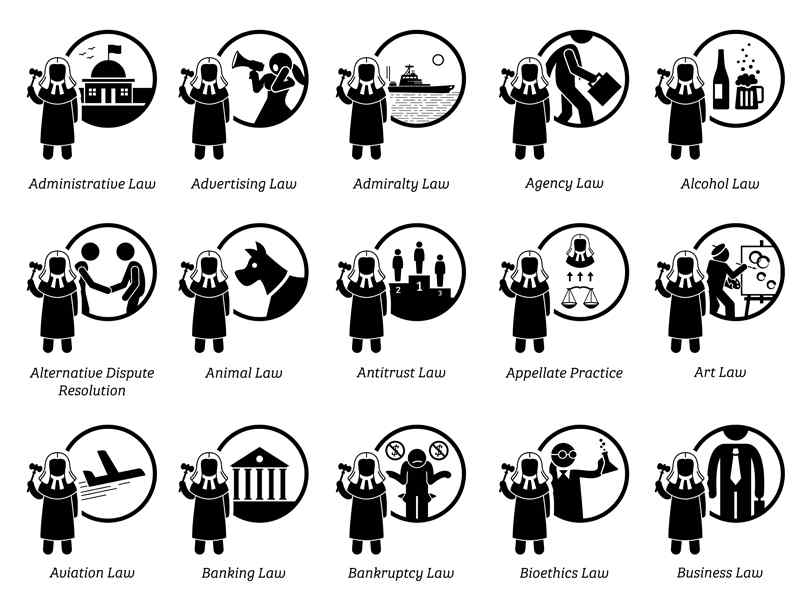
This article will look at the advantages and disadvantages of working in two broad categories of law firms: large and small law firms. These categories are somewhat arbitrary, of course — a New York firm with 150 attorneys in the office may well be a smaller firm, but a Denver law firm with 150 attorneys is large.
Large Law Firm Advantages

The primary advantage of large law firms is that they generally attract the most complex and challenging work. Because of high stakes in major litigation and large transactions, clients in these situations often want to draw from the vast legal and administrative resources of a large firm. In particular, huge international firms are gaining a lot of work because of the "full-spectrum" services they can provide to large multinational corporations.
Because large firms attract big clients and complex work, large-firm lawyers often enjoy an additional advantage — namely, they often rub shoulders with nationally or locally respected attorneys, law firms, business people, companies, government employees, politicians, and government agencies.

Another advantage of a large firm is that an attorney may specialize in a particular legal area. Associates and summer clerks may be encouraged to "shop around" in the firm to determine what areas interest them. Once the associate selects an area of specialization (and if it is a popular area, beats out the other new associates), a large firm will generally assign a mentor to make sure that the associate is well trained in that field of law.
Large firms have the resources to provide superior continuing legal education, so many large firms provide in-house training on a wide variety of issues. They also will sometimes pay for your trips for CLE to some fun destination. Additionally, they often encourage young associates to gain hands-on experience through participation in firm-subsidized pro bono programs.

Finally, large law firms pay well. It is not uncommon to find a junior associate whose annual salary is well into six figures. Summer clerks are also paid well and at some firms make $20,000 to $40,000 in one summer. Senior associates usually earn between $130,000 and $300,000 in a year, and partners even more.
Large Law Firm Disadvantages

The biggest disadvantage of a big law firm is the billable-hour requirement. Plain and simple, you get a high salary but have to work for it. Usually, you have a large billable-hour requirement, and forget about the terms "weekend" and "holiday." You can easily work 10- to 12-hour shifts six and seven days a week. And while you have a chance to work on the exciting cases, you are also likely to be given tasks such as document review or proofreading others' work.
The second issue is that due to the very size of the firm, you can become an interchangeable cog. You will not know many of your fellow employees very well. Office politics are usually rampant, and you can easily feel unappreciated. In addition, you may not fit in with the culture of the law firm.

Third, the largest law firms usually have high requirements when it comes to working for them. Usually, graduates of a lower-level law school need not apply. And the lower classes (i.e., those with lower class rankings) of so-called "second-tier" schools are also on the dicey ground.
Small Law Firm Advantages

You will get some responsibility quickly. Unlike in a large law firm, you will be the point attorney on several cases soon, and thus you will get your feet wet in a hurry. You can easily have much more experience in the courtroom, for example, than that Top 10 classmate of yours who went to New York.
An additional advantage is that many small firms are specialized, "boutique-style" firms. You can get lots of experience in the area in which a specialized firm focuses fast. At a non-specialized small firm, you will deal with actual people and can solve their problems in a way that doing document reviews for the latest mega-corporate lawsuit will not let you.

Small firms also let you work with and get to know the others in your firm quite well. You feel more like part of a team rather than just another cog in the Big Law machine. In fact, you will know the managing partners by name, and they will know you — something that is unlikely in big law firms.
Small Law Firm Disadvantages

Partnership depends on the economy — if the firm's business is slow, no matter how well you perform, you will not make it as a partner. Another disadvantage is that unless you are at a boutique firm, you have to take every case — from estates to weird tort cases. That is great if you like variety, but those usually are not the cases that really leave a mark in the law books. But they do help out real people.

Prestige and recognition cannot be gained from a small firm either, most of the time. Lateral moves may be more difficult. And, of course, your salary may be lower. On the other hand, that may not matter as much, as the only way you can practice in the country or a rural setting is via a small firm.
Conclusion
Starting with your goals and values will help you discover what it is like to work in a law firm, or if a law firm is right for you. Think about your family life and work-life balance needs. Lawyers prioritize an unhealthy work-is-everything mentality more than any other industry. If you have your needs top of mind when you research firms, when you apply, interview, and make the decision on whether or not to take an offer, you are much more likely to land in your dream scenario.
Whatever firm you want to practice in, you will need to recognize the advantages and disadvantages of that firm. And grab the opportunities as per your needs. Good luck!





